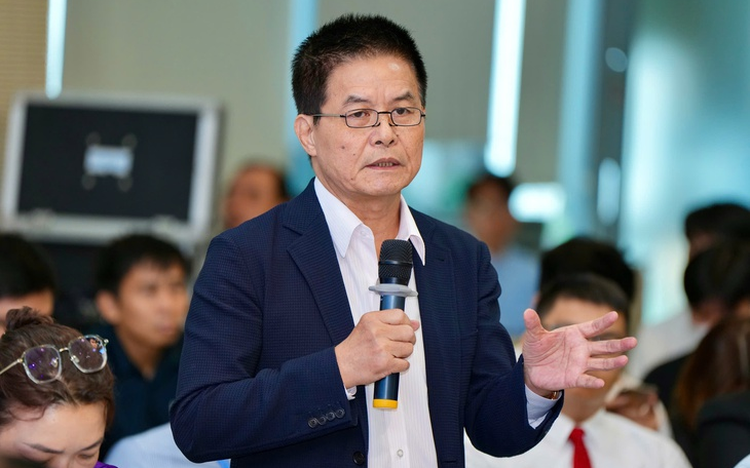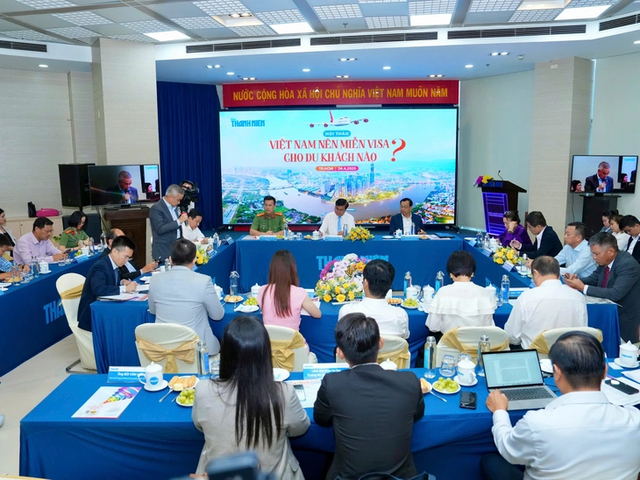
Nguyen Quoc Ky, chairman of Vietravel. Photo: Tuoi Tre
At the seminar titled "Which Tourists Should Vietnam Open Visas To?" organized by Thanh Nien (Young People) newspaper, industry leaders and business representatives offered frank assessments of Vietnam's visa approach.
Nguyen Quoc Ky, chairman of Vietravel, noted that he has been discussing visa issues for over a decade.
"If we don't approach visa policy correctly, nothing will change," Ky said. "After COVID-19, we reopened too slowly and missed a golden opportunity to reboot tourism. As Vietnam enters a new phase, will we miss it again?"
He emphasized that visa policy should be integrated into broader economic planning, with tourism officially recognized as a key economic driver. "We've been reactive for years—never strategic, never fresh," he added.
Citing comparisons with regional peers, Ky noted that Singapore allows visa-free access from 158 countries, Indonesia 163, the Philippines 157, and Thailand 93. Vietnam, by contrast, offers visa exemption to only 26 countries and e-visas to 80.
He argued that the current visa exemption decisions lack effectiveness because they're not part of a clear strategy to prioritize tourism. "Visa is just one piece," he said.
Ky also pointed out a missed opportunity around the 50th anniversary of Vietnam's reunification. "The event was planned a year in advance. Why didn't we offer visa-free entry from April 1 to June 1 to attract tourists?"
He praised Thailand for adjusting its visa policy 15 times in 90 days post-pandemic. "They treated visas as a tool. We treat it like a lock—hard to open. What we need are smart, specific, and flexible policies."
Ky proposed adopting international models that issue visas based on market demand, event schedules, or traveler profiles, including wealthy individuals, scientists, and investors. He stressed the need for a central coordinating agency, warning that delays arise when visa matters require approval from multiple ministries.
He remains hopeful that Vietnam can still adopt flexible policies in time for the summer travel season and National Day (September 2).
New visa strategy needed
Luong Hoai Nam, CEO of Bamboo Airways, agreed that Vietnam's visa policy has long been a barrier to tourism growth.
"We need to change our mindset," he said. "If we view visas as a way to boost competitiveness, we can finally resolve this longstanding bottleneck."

The 'Which Tourists Should Vietnam Open Visas To?' seminar in Ho Chi Minh City on April 24, 2025. Photo: Tuoi Tre
Vo Anh Tai, deputy general director of Saigontourist Group, supported a more selective visa waiver strategy.
"For major source markets that aren't yet exempt—like China, the U.S., India, and countries in the Middle East—we need to act now," he said.
Tai proposed offering long-term visas, lasting five to ten years, to high-net-worth individuals, experts, and investors. Businesspeople investing at least US$10 million or individuals earning more than $80,000 per year could qualify for special "talent visas," he added.
He also called for simplifying the visa application process, supporting urgent or medical travel, and removing non-tariff barriers. Tai endorsed the idea of an ASEAN common visa, allowing travelers to visit multiple countries on one visa.
Nguyen Quang Trung, head of development planning at Vietnam Airlines, said leading tourist destinations use flexible visa policies alongside strong air connectivity.
He recommended prioritizing visa waivers for markets with high tourism and investment potential, including 20 EU countries not currently exempt—such as Switzerland, Poland, the Czech Republic, Hungary, and Portugal—as well as the U.S., Canada, Australia, the UAE, Saudi Arabia, and Brazil.
Trung also proposed piloting short-term visa waivers within 12 months for visitors from China, Hong Kong, Taiwan, and India. He suggested extending the current visa-free stays to 90 days for tourists from Europe, North America, and Australia, and offering 24-month visas for investors and experts.
He emphasized simplifying the e-visa system and reducing processing time to under 24 hours.
Nguyen Thu Thuy, marketing director at Vingroup, introduced the idea of "product-linked visas," where exemptions would apply only to visitors booking full-package tours through verified agencies and staying at licensed accommodations.
She also advocated for flexible, seasonal visa policies applied during specific campaigns or peak travel periods.
Tourism needs coordination, not just visas
Nguyen Trung Khanh, head of the Vietnam National Authority of Tourism, stressed that tourism is a comprehensive economic sector requiring coordination across industries—not just a shift in visa policy.
He emphasized that while tourism-related visa reforms must support the economy, they also have to maintain national security.
"We plan to propose exemptions for high-spending, long-stay tourists from Northeast Asia and ASEAN, as well as markets with direct or planned flight routes," he said.
From the Ministry of Culture, Sports and Tourism's perspective, additional visa waivers are being proposed for international athletes, coaches, footballers, filmmakers, and journalists attending major events in Vietnam.


Max: 1500 characters
There are no comments yet. Be the first to comment.